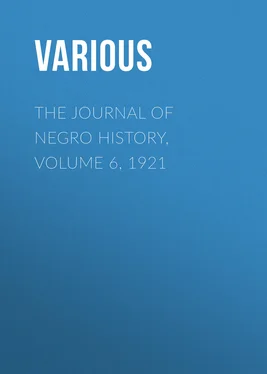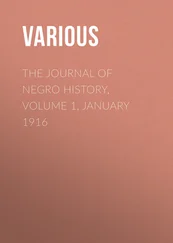Various - The Journal of Negro History, Volume 6, 1921
Здесь есть возможность читать онлайн «Various - The Journal of Negro History, Volume 6, 1921» — ознакомительный отрывок электронной книги совершенно бесплатно, а после прочтения отрывка купить полную версию. В некоторых случаях можно слушать аудио, скачать через торрент в формате fb2 и присутствует краткое содержание. Жанр: foreign_antique, periodic, История, foreign_edu, на английском языке. Описание произведения, (предисловие) а так же отзывы посетителей доступны на портале библиотеки ЛибКат.
- Название:The Journal of Negro History, Volume 6, 1921
- Автор:
- Жанр:
- Год:неизвестен
- ISBN:нет данных
- Рейтинг книги:4 / 5. Голосов: 1
-
Избранное:Добавить в избранное
- Отзывы:
-
Ваша оценка:
- 80
- 1
- 2
- 3
- 4
- 5
The Journal of Negro History, Volume 6, 1921: краткое содержание, описание и аннотация
Предлагаем к чтению аннотацию, описание, краткое содержание или предисловие (зависит от того, что написал сам автор книги «The Journal of Negro History, Volume 6, 1921»). Если вы не нашли необходимую информацию о книге — напишите в комментариях, мы постараемся отыскать её.
The Journal of Negro History, Volume 6, 1921 — читать онлайн ознакомительный отрывок
Ниже представлен текст книги, разбитый по страницам. Система сохранения места последней прочитанной страницы, позволяет с удобством читать онлайн бесплатно книгу «The Journal of Negro History, Volume 6, 1921», без необходимости каждый раз заново искать на чём Вы остановились. Поставьте закладку, и сможете в любой момент перейти на страницу, на которой закончили чтение.
Интервал:
Закладка:
In the Maryland case of Pope v. Williams 68 68 193 U. S., 621.
the court further explained its position. While the State cannot restrict suffrage on account of color, the privilege is not given by the Federal Constitution, nor does it spring from citizenship of the United States. While the right to vote for members of Congress is derived exclusively from the law of the State in which they are chosen but has its foundation in the laws and Constitution of the United States, the elector must be one entitled to vote under its statute. A law, therefore, requiring a declaration of intention to become citizens before registering as voters of all persons coming from without Maryland is not a violation of the Constitution.
In the case of Guinn v. United States 69 69 238 U. S., 347.
the court held that the literacy test was legal and not subject to revision but in this clause of the constitution that part of a section providing for literacy was closely connected with the so-called grandfather clause that the United States Supreme Court declared both unconstitutional as it did in the case also of Myers v. Anderson , 70 70 Ibid. , 368.
coming from Annapolis, Maryland, and in the case of The United States v. Mosely , from Oklahoma. 71 71 Ibid. , 763.
The clause referred to follows:
"No person shall be registered as an elector of this State or be allowed to vote in any election herein, unless he be able to read and write any section of the Constitution of the State of Oklahoma; but no person who was on January 1, 1866, or at any time prior thereto, entitled to vote under any form of government, or who at that time resided in some foreign nation, and no lineal descendant of such person, shall be denied the right to register and vote because of his inability to read and write sections of such constitution. Precinct election inspectors having in charge the registration of electors shall enforce the provisions of this section at the time of registration, provided registration be required. Should registration be dispensed with, the provisions of this section shall be enforced by the precinct officer when electors apply for ballots to vote."
The court held that this was a standard of voting which on its face was in substance but a revitalization of conditions which when they prevailed in the past had been destroyed by the self-operative force of the Thirteenth Amendment.
Educational Privileges
These suffrage laws left the Negroes in an untoward situation for the reason that there was little hope that, with the educational facilities afforded them, that they would soon be able to meet the same requirement of literacy as that which might not embarrass the whites offering themselves as jurors and electors. The States upheld in their action by the United States Supreme Court, had shifted from their shoulders the burden of the uplift of the Negro by the ingenious doctrine that equal accommodations did not mean identical accommodations and that the spirit and the letter of the law would be complied with by providing separate accommodations for Negroes. In the end, however, separate accommodations turned out to be in some cases no accommodations at all.
This was the situation as it was brought out in the case of Cumming v. The Board of Education of Richmond County . 72 72 175 U. S., 528.
It appeared that a tax for schools had been levied in this district. The Negroes objected to paying that portion of the tax which provided for the maintenance of a high school, the benefits of which they were denied, when there was no high school provided for them. The board of education of Richmond County had maintained a high school for Negroes but abolished it. The petitioner prayed, therefore, that an injunction be granted against the collection of such portion of the school tax as was used for the maintenance of said high school. The defendant set up the plea that it had not established a white high school, but had merely appropriated some money to assist a denominational high school for white children, saying "that it had to choose between maintaining the lower schools for a large number of Negroes and providing a high school for about sixty." The board of education, declared, moreover, that the establishment of a Negro high school was merely postponed.
The opinion of the court was that a decision by a State court, denying an injunction against the maintenance by a board of education of a high school for white children, while failing to maintain one for Negro children also, for the reason that the funds were not sufficient to maintain it in addition to needed primary schools for Negro children, does not constitute a denial to persons of color of the equal protection of the law or equal privileges of citizens of the United States. The court held that under the circumstances disclosed it could not say that this action of the State court was, within the meaning of the Fourteenth Amendment, a denial by the State to the plaintiffs and to those associated with them of the equal protection of the laws, or of any privileges belonging to them as citizens of the United States. While the court admitted that the benefits and burdens of public taxation must be shared by citizens without discrimination against any class on account of their race, it held that the education of people in schools maintained by State taxation is a matter belonging to the respective States, and any interference on the part of Federal authority with the management of such schools cannot be justified except in case of a clear unmistakable disregard of rights secured by the supreme law of the land.
This is downright sophistry. To any sane man it could not but be evident that this was an "unmistakable disregard of rights secured by the Supreme law of the land." The school authorities had separated white and Negro children for purposes of education on account of race and had, moreover, refused to grant the Negro children the facilities equal to those of the white. The State, in the first place, in establishing separate schools on the basis of race, violated a right guaranteed the Negro race by the Constitution of the United States, and the board of education of Richmond County violated still another in failing to provide for the Negroes the same facilities for high school education as those furnished the whites while taxing all citizens without regard to race. It is true that the Federal Government cannot generally interfere in matters of police regulation of persons and property in the States but when the matter of race is introduced the national authority is thoroughly competent within the Constitution to restrain such local government or any group of persons so authorized by such government. It would have been unwise for the court to enjoin the collection of such a tax but it could have on the constitutional points raised in this case declared invalid laws separating the races for purposes of education.
The sophistry of the Supreme Court in seeking to justify its refusal to maintain the rights of the Negro to education is still more evident from its opinion in the case of Berea College v. The Commonwealth of Kentucky , decided in 1908. Berea College was established in 1856 by a group of antislavery Kentucky mountaineers, led by John G. Fee, desiring to bring up their children in the love of free institutions. There were no Negro students prior to the Civil War but a few Negro soldiers were admitted on returning home from the front in their uniforms and members of the race were thereafter welcomed at Berea. In the course of time, however, this coeducation of the races became very distasteful to the State of Kentucky with its decided increase in race prejudice necessitating in their economy a thorough proscription of the Negro race. In 1904, therefore, the State of Kentucky enacted a law against persons and corporations maintaining schools for both white persons and Negroes.
Читать дальшеИнтервал:
Закладка:
Похожие книги на «The Journal of Negro History, Volume 6, 1921»
Представляем Вашему вниманию похожие книги на «The Journal of Negro History, Volume 6, 1921» списком для выбора. Мы отобрали схожую по названию и смыслу литературу в надежде предоставить читателям больше вариантов отыскать новые, интересные, ещё непрочитанные произведения.
Обсуждение, отзывы о книге «The Journal of Negro History, Volume 6, 1921» и просто собственные мнения читателей. Оставьте ваши комментарии, напишите, что Вы думаете о произведении, его смысле или главных героях. Укажите что конкретно понравилось, а что нет, и почему Вы так считаете.












